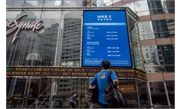COMMENTS / EXPERT ASSESSMENT
US-listed Chinese companies to accelerate homecoming

Illusration: Tang Tengfei/GT
Whether or not US-listed Chinese companies should return to Chinese stock markets now seems to be an issue of concern as the bilateral tensions elevate, and risks keep accumulating in the US financial system. A homecoming trend led by Chinese tech giants is set to accelerate.The US government's wanton and ill-explained closure of the Chinese consulate in Houston has further worsened China-US relations. US politicians are now pushing tensions into the financial arena, which poses a severe threat to the legitimate interests of Chinese companies listed in New York.
US Republican Senator Marco Rubio, a China hawk, last week urged the Trump administration to pursue tougher rules for Chinese companies listed in the US. Earlier this month the senator was reportedly preparing a bill to ban Chinese companies from listing in the US, and some rightist media outlets are talking about ousting Chinese companies and even launching a financial war.
Now, some Chinese businesses are spooked that the Trump administration may throw its weight around those US-listed Chinese companies. Such blunt actions are intended to fuel anti-China sentiment in America which will help Trump's reelection bid.
Over the weekend, the chief representative of NASDAQ China said he remains optimistic that more Chinese companies will file for IPOs in the US in 2021, while they are likely to seek more options on the A-share or Hong Kong markets in the middle term.
So far this year, 19 Chinese companies have listed on the New York Stock Exchange (NYSE) including the NASDAQ market, more than double the number during the same period last year.
Wall Street is eager to attract more Chinese companies to the market to maintain its globally leading position. Chinese companies, especially those in emerging sectors, are willing to list in the US to get a higher initial public offering (IPO) price. Clamor from US politicians is only interrupting such pragmatic cooperation, but the disruption it brings to market mechanisms should not be underrated.
To deal with the rising US threats, an increasing number of Chinese companies listed in the US are bound to continue the trend of returning home to list on China's mainland market or Hong Kong market.
Hundreds of Chinese companies went public in the US more than a decade ago as US capital markets were at that time more inclusive than Chinese capital markets. They offered more options for Chinese companies, especially for startups unable to profit in the short term.
However, as the US may tighten its listing rules to restrict Chinese firms, Chinese capital markets are maturing and becoming more inclusive to welcome more of its companies back home.
Beijing's local financial regulator is reportedly planning to comb through US-listed Chinese firms and support those willing to return to the A-share or Hong Kong markets.
The Shanghai Stock Exchange in June also issued new regulations to support the return of US-listed Chinese companies to the Shanghai Sci-Tech Innovation Board, or STAR market. A new share index focused on Chinese tech giants has been launched by Hong Kong's stock market.
Successful secondary IPOs in Hong Kong from Chinese internet giants such as Alibaba and NetEase have now inspired other listed Chinese firms to follow suit. Flexible display maker Royole Corp, a Chinese company, was recently reported to be weighing an IPO in China and halting its planned US IPO. For US-listed Chinese companies willing and qualified to list in China, seeking a return to the Chinese capital market is the natural choice.
The author is deputy managing editor of Securities Daily and an expert adviser for the China Securities Regulatory Commission. bizopinion@globaltimes.com.cn



